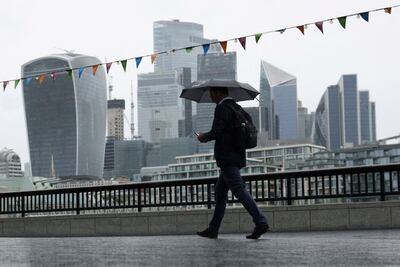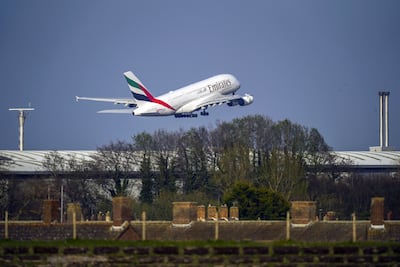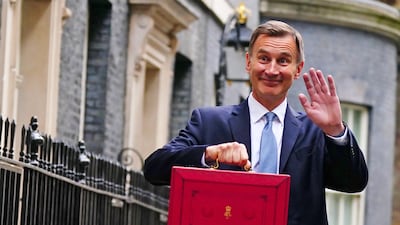Big tax giveaways are reserved for chancellors presiding over booming and growing economies.
Unfortunately for Jeremy Hunt, the UK economy is currently in rather a sorry state, stalked by stagnation, recession and a lack of growth.
He will deliver what may be his last budget on Wednesday, should his Conservative Party lose the next election, which is widely expected to take place in the autumn.
Pundits are predicting a highly politicised budget, one which the Conservatives hope will impress voters with headline-grabbing tax cuts.
While chancellors of the Exchequer always like to pull a rabbit out of the hat when they take to the dispatch box in Parliament, distraction techniques may be more the name of the game for Mr Hunt.
“We have a Chancellor, and a government, that is fighting for life, so we are likely to get a piece of political theatre designed to generate headlines and try to win votes,” Russ Mould, investment director at AJ Bell, told The National.
On that score, it seems non-doms are toast.
Non-doms in focus?
Mr Hunt can only work with what he has got and the number-crunching by the Office for Budgetary Responsibility (OBR) shows he has about £13 billion ($16.5 billion) of so-called headroom to juggle with within the fiscal rules.
It is currently being speculated that one of the big targets of Mr Hunt's Budget will be those who are not domiciled in the UK and, as such, do not pay tax on their overseas earnings – the so-called non-doms.
Economists at the London School of Economics and the University of Warwick calculated that removing the non-dom tax status would bring in as much as £3.2 billion in tax revenue, about half the cost of taking 1p off income tax.
The same research also found that more than one in five senior bankers in the City of London financial district have claimed non-dom tax status at one time or another.

If the status was removed in the UK, it would affect about 70,000 people who currently do not pay income tax or capital gains tax on their overseas earnings.
The issue of the non-dom tax status was thrust into the spotlight two years ago, after it emerged that it was enjoyed by Prime Minister Rishi Sunak’s wife, Akshata Murty. She has since agreed to pay UK tax on her overseas earnings.
The number of people claiming non-dom status in the UK has been falling for some time, following a change in the rules to stop it being permanent. At the moment, there are 68,800 non-doms in the UK, who contributed £8.5 billion to the Exchequer in the 2021/2022 tax year.
The UK's non-doms often own properties and business that not only create jobs, but also generate earnings and capital gains that are subject to UK tax.
Mr Hunt remarked in 2022 that scrapping the status would simply serve to drive non-doms, many of whom are wealthy job-creating entrepreneurs, away from the UK. They would not have to go far. Ireland also operates a non-dom system.
It could be argued that Ireland's tax system is more attractive anyway. In the UK, there are time limits for the status and a £60,000 annual charge for the very wealthy – restrictions Ireland does not have. It has been suggested Mr Hunt might ramp that figure up to £150,000.
As such, some tax watchers argue that targeting the non-dom tax status could actually be one of those measures that grabs a headline on budget day, but backfires in terms of money flowing in the Exchequer's coffers in the long-term.
Removing the non-dom tax status would also be a tricky political move for Mr Hunt and represent somewhat of an about-turn to his position two years ago when he told the BBC that non-doms were “foreigners who could live easily in Ireland, France, Portugal, Spain”.
“They all have these schemes. All things being equal, I would rather they stayed here and spent their money here,” he said.
Non-dom status is also seen as an attractive perk for high-earners in London. A recruiter for hedge funds recently told Bloomberg the removal of the status would seriously damage London’s appeal.
“Clients say, ‘I love living in London,’ but there is a cost of doing so at which you say this is unacceptable,” said Mark Davies, a tax adviser for the super-wealthy. “There is a sense that cost is going over a tipping point.”
The opposition Labour party has indicated it would scrap the non-dom tax status should it come to power, but would allow for a four-year grace period.
Nonetheless, some experts say that the overall value of the non-doms to the economy as a whole, outweighs the short-term benefits of removing the status, if they relocated their tax affairs to places such as Ireland, Malta and Singapore.
“There has also been speculation that a Labour government might seek to dismantle the current non-dom status regime, but personally I think that is unlikely as the presence and buying power of the non-doms is important to all the political parties,” Peter Wetherell, executive chairman of the prime residential Mayfair estate agents Wetherell, told The National.
For Anthony Whatling, managing director at Alvarez & Marsal Tax, Mr Hunt will have to weigh up the pros and cons of scrapping the non-dom tax status.
“As always, the balance will be between the short-term lift from collecting taxes from non-doms who are a current captive audience and the longer-term risk that non-doms vote with their feet and leave for more attractive shores,” he said.
Air passenger duty
There is some speculation that the chancellor will increase air passenger duty in order to raise tax revenue.
A quick glimpse at the cost breakdown of a flight ticket departing the UK shows that the much of the total is made up of fuel surcharges, airport levies, environmental charges and an air passenger duty (APD).
The APD has been in place since 1993, when the then Conservative chancellor Kenneth Clarke introduced as an alternative to a fuel tax, which was banned in the EU.
Initially, the APD was set at £5 for European flights and £10 for long haul flights. Today, it can constitute about £175 of the cost of a ticket.
The amount of APD that is attached to the cost of an air fare for a flight leaving the UK now depends on how the flight is going and which class the passenger is seated in.

The distance from London to the destination cities is divided into three bands: A, B and C. Essentially, band A covers European flights, band B is for cities that lie between 2,001 and 5,500 miles (3,218km and 8,851km) from London, which includes Abu Dhabi and Dubai, and band C is for long haul flights of more than 5,500 miles from London.
There is also a domestic band that covers flights taking off and landing within the UK.
Plane operators also have to calculate the number of passengers in each class (economy, business and first) and pay the APD accordingly, while passing the cost on to the passengers.
For business and private jets, the APD system is even more complicated and depends on which way the seats face and the amount the seats can recline.
For example, under charging plans, which are due to come in next month, the APD per passenger on a jet carrying fewer than 19 passengers would be £581 a passenger.
An economy seat on a flight from London to Dubai will incur an APD of £88 from April 1, while the duty on a business class seat will be £194.
But there is speculation that Mr Hunt could change some of these charges in his budget on Wednesday, especially the business class APD.
The OBR has calculated that the APD will raise £3.8 billion in the 2023/24 tax year, so the temptation for Mr Hunt will be to increase the duty on some, if not all, classes of travel.
In September last year, British Prime Minister Rishi Sunak pledged that there would be no new taxes to flights that would “to discourage flying or going on holiday”.
While it could also be argued that APD is not a new tax, an airline industry source told The Telegraph newspaper that an increase in APD would be “against the spirit of the promise”.
The UK's APD is the only tax of it's kind in the world, and the airlines have long opposed it. Last month, budget airline Ryanair said UK airports are at an “enormous disadvantage” because of the APD.
“London will be always fine but where UK APD is doing untold damage is to the regional UK airports,” said Ryanair's chief commercial officer Jason McGuinness.
“I think that's going to get worse over the next number of years, predominantly because European airports are becoming significantly more competitive.”
Tax-free shopping
In his autumn statement last year, Mr Hunt indicated that he might consider reintroducing tax-free shopping for international travellers, something which Rishi Sunak removed when he was chancellor three years ago.
Mr Hunt announced that the OBR would revisit its calculations on tax-free shopping and present its findings alongside the Budget.
Retailers, particularly high-end shops in London's West End, claim the loss of the ability of international tourists to claim back 20 per cent VAT on their purchases has cost the economy dearly, as potential UK visitors opt to do their shopping in other European cities, especially Paris and Milan.
Hoteliers, restaurateurs and others involved in the UK's hospitality sector say the loss of tax-free shopping has had a knock-on effect on tourist numbers and spending.

The British Chambers of Commerce, several chief executives of leading hotel and retail groups, as well as the boss of London's Heathrow Airport, have all called for the reinstatement of tax-free shopping for international visitors. The UK is the only country in Europe that does not have it.
The lobbying efforts seemed to be going well until a few weeks ago, when a government minister appeared to pour cold water on the idea.
Nigel Huddleston, the minister responsible for the tax system, said in a letter seen by the by The Times that it was “not possible to introduce the same system as before, given that it would now need to be open to visitors from the EU, as well as the rest of the world”.
Mr Huddleston argued that because of Brexit, tourists from the EU are now essentially international visitors to the UK. This means that the VAT relief would have to be extended to those from the union.
According to data from Statista, while the biggest group of overseas visitors to the UK comes from the US, the next seven largest groups are all from European countries – France, Ireland, Germany, the Netherlands, Spain, Poland and Italy.
Aside from this, the reintroduction of tax-free shopping would have little impact either way on UK households, so for that reason alone experts feel its reinstatement is far down Mr Hunt's list of priorities for his Budget.
“I think the problem with the tax-free shopping issue is that it is something that was abolished by Rishi Sunak when he was chancellor, when he claimed it cost the country billions in lost VAT revenue and removing it would therefore be an overall benefit,” Stuart Cole, chief macro economist at Equiti Capital told The National.
“If Hunt brings it back so soon after it was abolished, then he is effectively saying Sunak was wrong to get rid of it. I think the body of evidence does, indeed, suggest that its removal has been a mistake. But is Hunt willing to potentially embarrass his boss? I doubt it.”
Limited scope for tax cuts
In highly politicised budgets, finance ministers look to please crowds with tax cuts and raise revenue from sources that have little or no immediate effect on voter households.
As such, taxing foreigners is much easier than taxing voters. For example, last year Singapore raised the stamp duty on property transactions made by foreign buyers by 60 per cent. The UK's Labour party is considering making changes to stamp duty on property purchases by overseas buyers, should it get into government.
But the effectiveness of aiming tax measures at overseas property buyers, non-dom residents and international visitors is limited, and any tinkering is unlikely to make much of a difference to the prospects for the UK economy.
A cut to income tax or national insurance may look like a crowd-pleasing move, but it will be tempered by the fact that millions of people are paying more tax now than a few years ago simply because tax thresholds have been frozen – what is called fiscal drag.
Craig Rickman from Interactive Investor told The National that because the freezes are set to remain until 2028, “the tax bills of both workers and retirees will continue to rise over the coming years”.
Earlier this week, the Institute of Fiscal Studies said that the “the economic case for tax cuts is weak” and that the public finances remained in a “poor position”.
The IFS added that revenue from taxation is forecast to climb to as much as 37.7 per cent of national income by the 2028/29 tax year – which would be the highest level since the Second World War.
Analysts say the burden-weary British taxpayer ought to be unimpressed with any short-term headline giveaways or yet more tweaking at the edges of the tax system.
“I don’t think the Chancellor has much ability in next week’s budget to make meaningful changes to spending and taxation that, in themselves, will boost growth,” Mr Cole told The National.
“The public has already expressed its distaste for ‘austerity’, and without any meaningful spending cuts the room for tax cuts is extremely limited.”

















